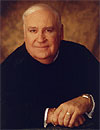 When a 63-year-old man named Bob Briner (pictured, left) died of cancer in June 1999, The
New York Times ran an obituary focusing on his accomplishments, including
taking televised tennis to Asia, agenting for Michael Jordan, and garnering
an Emmy Award for a documentary on the life of tennis great Arthur Ashe.
When a 63-year-old man named Bob Briner (pictured, left) died of cancer in June 1999, The
New York Times ran an obituary focusing on his accomplishments, including
taking televised tennis to Asia, agenting for Michael Jordan, and garnering
an Emmy Award for a documentary on the life of tennis great Arthur Ashe.But just as the establishment press misses many stories with a faith component, the Times barely gave one sentence to what will undoubtedly be Briner's most enduring accomplishment: his authorship, late in his life, of several books that have turned Christian America upside down.
In 1991, Briner decided to make use of the enormous amount of time he spent on airplanes and, taking a pen to a yellow legal pad, put his thoughts to paper for what would later become the slim paperback "Roaring Lambs."
Briner's message? Christians had no one else to blame for the decay of American culture but themselves. Because of their decision to abandon the arts, music, journalism, and academia, their ideas were no longer reflected in the milieu of American life. Christians had been like timid lambs, Briner argued, but now it was time for them to clear their throats and roar.
Briner had wanted to call the book "Saline Solution."
"Get it? Briner-Saline Solution," he joked in the introduction. This executive turned cultural thinker wrote about what it meant to follow Christ's command that his people be the salt of the earth, noting repeatedly that salt as a preservative agent could not be effective from a distance.
Briner was writing around the time of the controversy over the rap group 2 Live Crew's obscene lyrics, when Christian contributions to film consisted of gathering 5,000 of the faithful and marching in protest of "The Last Temptation of Christ."
At first, the book sold modestly, but over the next seven years it became the premiere cultural manifesto for a generation of young Americans fed up with the culture their Christian parents dropped out of and left them with. For many Gen X Christians, Briner was the only grown-up who had the courage to say that this had been a disaster, and his book became for them what Mao Tse Tung's Little Red Book was to young Chinese Marxists: marching orders for a great cultural revolution that is now in quiet bloom.
Briner encouraged his charges to cast off the mediocrity and small mindedness they had learned in their little Christian schools and march into the culture, retaking institutions one reporter, musician, teacher, and executive at a time. Politely chastising those believers who had joined institutions that catered to the interests of other Christians for being disobedient to Christ's command to engage the world, Briner made it clear that he saw little value in Christians speaking, singing, and asking for donations from one another.
Seven years later, his disciples have fanned out throughout the culture, and as "Roaring Lambs" climbs past 100,000 copies sold, Briner is finding new popularity with the posthumous release of his final book, "Final Roar"; the re-release of "Roaring Lambs"; and a companion CD soundtrack featuring the work of artists who claim Briner as their inspiration.
In Christian pop culture circles today, Briner is nearly a saint, but the irony for those who knew him is that like Christ himself, he is embraced and lauded publicly by people who to this day refuse to internalize his message and instead live professional lives that are in direct contradiction to Briner's message.
The CD, for instance, features mostly roaring lambs like Sixpence None The Richer and Jars Of Clay, but also a few meowing lambs--artists who despite their rhetoric still play for the home crowd--playing safe, Christian-oriented concert venues, failing to tour with mainstream acts, and spending more time on the 700 Club than VH-1.
For these, and Contemporary "Christian" Music (CCM) executives who continue to effectively keep music made by devout Christians from the "secular" masses by insisting that it be marketed as a separate genre called CCM and stocked in the religious sections of record stores and played on faux Christian MTV channels, Briner's words will continue to get under their skin.
"CCM is intramurals," he once said, urging artists to hone their skills there if necessary but ultimately join the real world.
Ironically, the artists most in tune with Briner philosophically sound the best musically and none more so than Sixpence None the Richer, which followed Briner's playbook to the top of the pop charts, faith intact, and sing of him: "We walk the ground that you shook and we read the words in your book.... I see your choice, I hear your voice, it's written on us."

